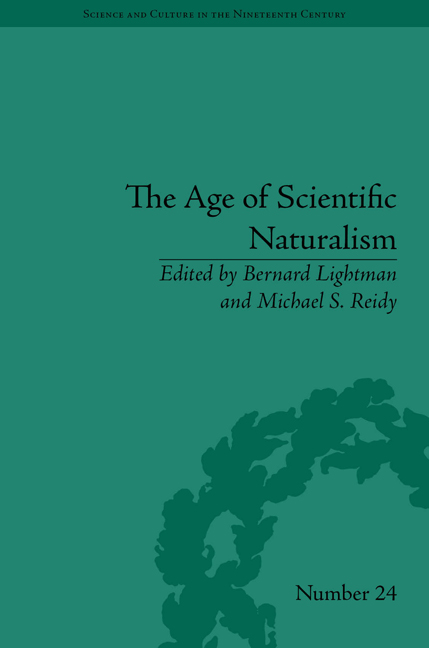Book contents
- Frontmatter
- CONTENTS
- Dedication
- Acknowledgements
- List of Contributors
- List of Figures
- Introduction: John Tyndall, Scientific Naturalism and Modes of Communication
- Part I John Tyndall
- Part II Scientific Naturalism
- 4 Herbert Spencer and the Metaphysical Roots of Evolutionary Naturalism
- 5 Evolutionary Mathematics: William Kingdon Clifford's Use of Spencerian Evolutionism
- 6 The ‘Great Plan of the Visible Universe’: William Huggins, Evolutionary Naturalism and the Nature of the Nebulae
- 7 Alfred Newton: The Scientific Naturalist Who Wasn't
- Part III Communicating Science
- Notes
- Index
4 - Herbert Spencer and the Metaphysical Roots of Evolutionary Naturalism
from Part II - Scientific Naturalism
- Frontmatter
- CONTENTS
- Dedication
- Acknowledgements
- List of Contributors
- List of Figures
- Introduction: John Tyndall, Scientific Naturalism and Modes of Communication
- Part I John Tyndall
- Part II Scientific Naturalism
- 4 Herbert Spencer and the Metaphysical Roots of Evolutionary Naturalism
- 5 Evolutionary Mathematics: William Kingdon Clifford's Use of Spencerian Evolutionism
- 6 The ‘Great Plan of the Visible Universe’: William Huggins, Evolutionary Naturalism and the Nature of the Nebulae
- 7 Alfred Newton: The Scientific Naturalist Who Wasn't
- Part III Communicating Science
- Notes
- Index
Summary
Introduction
Evolutionary naturalism has been traditionally identified with empiricism and materialism, in opposition to the metaphysical speculations of the movement's theological antagonists. Typical in this regard was the definition of the movement given by James Ward in his Gifford Lectures, which was cited by Frank Turner in Between Religion and Science:
The naturalistic philosophy consists in the union of three fundamental theories: (1) the theory that nature is ultimately resolvable into a single vast mechanism; (2) the theory of evolution as the working of that mechanism; and (3) the theory of psychophysical parallelism or conscious automatism, according to which theory mental phenomena occasionally accompany but never determine the movements and interactions of the material world.
As Turner stressed in his gloss on this definition, scientific (or evolutionary) naturalism repudiated supernaturalism and constructed its interpretation of man, nature and society from the theories, methods and categories of empirical science rather than from rational analysis. In temperament it was secular; in philosophy, empiricist. It held that the scientific method was the only means of acquiring true knowledge, and this method in turn gave support to three theories which were eagerly embraced by the scientific naturalists: Dalton's theory of the atom, the law of the conservation of energy, and the Darwinian theory of evolution.
- Type
- Chapter
- Information
- The Age of Scientific NaturalismTyndall and his Contemporaries, pp. 71 - 88Publisher: Pickering & ChattoFirst published in: 2014



